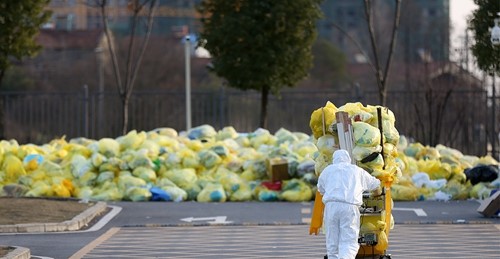
A worker pushes a trolley full of infectious medical waste in the Zhongfa Xincheng branch of Wuhan Tongji Hospital on February 18. (Photo: GT)
Despite positive signs, China's health authorities announced Tuesday that epidemic prevention and control of COVID-19 in the epicenter Wuhan will continue the "strictest-ever" measures, while top officials of Hubei Province warned that the complex epidemic situation required that related authorities should be cautious rather than trust in luck.
Down to community levels, urgent tasks such as screening of potential virus carriers and safeguarding medical and daily necessities supply still face difficulties in practice.
The National Health Commission announced on Tuesday that the "strictest-ever" measures in Hubei will continue, and the outflow channels leaving Wuhan and Hubei will still be under tight control.
On Monday, Wuhan authorities retracted a policy easing the city lockdown hours after its announcement. The previous release was reportedly signed by a deputy mayor of Wuhan before getting approved by senior officials of the city's epidemic prevention and control command center.
Chinese experts take the move as a signal of loose management within the Wuhan government while the epidemic situation is still tough in the city, warning that it is too early for local governments to relax.
As a quick reaction to the move and criticism from experts and netizens, Ying Yong, Party chief of Hubei Province, said at a working meeting on Monday afternoon that communities should continue dragnet-style screening of suspected infection and close contacts.
Ying asked people to remain cautious and avoid trusting in luck or slackening vigilance. He stressed that key points lie in rescuing critical patients to reduce fatalities, increasing production of medical supplies in the province, and ensuring living necessities amid the strict lockdown.
Ying's remark was followed by reports on Tuesday saying that Wang Zhonglin, Wuhan's new Party chief, investigated some communities in Wuhan, which should be implementing strict 24-hour closed-off management, in secret — only to find many loopholes still existed in their management.
For example, cars were able to get into communities without being investigated by community workers, and senior residents who live alone could only get living materials delivered to their homes once a week.
Wang slammed such relaxed management and called for every individual to fulfill their responsibilities.
"We have paid a lot in this war and come to a vital time when we have to persist, or we would fall short of success for lack of a final effort," Wang noted.
Shortages of medical staff have been relatively eased while the hospitalization of patients and suspected cases is quicker, said a local doctor who required anonymity.
Some Hubei residents outside Wuhan called for easing control policies after noticing decreasing infections over the past week. But Yang Zhanqiu, deputy director of the pathogen biology department at Wuhan University, said the suggestion was "too early as the virus could be resurrected with a little bit of relaxation."
Screening of potential virus carriers was not completed in Wuhan, and loosening the control measures outside Wuhan may lead to a virus resurgence in these places, Yang told the Global Times.
"It is understandable that grassroots officials face great pressure in the long-term battle against the virus, but since it's a war, they should mobilize all possible resources to finish the work and try their best to win people's support," Ren Jianming, a Beijing-based professor of public management, told the Global Times on Tuesday.
Some officials and residents may have thought the situation was getting better after seeing fewer infection cases and more hospitals with medical workers from across the country coming to offer support. But such positive signs can only be maintained based on successful control of communities, otherwise the situation may go back to one month ago with large-scale human-to-human transmissions, Ren said.


